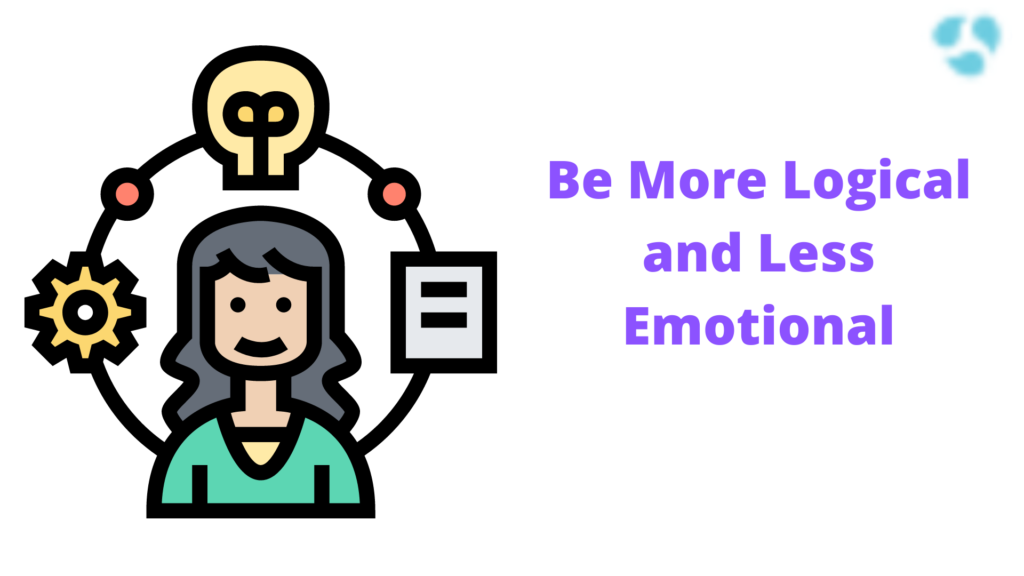Do you find yourself being too sensitive and emotional? Do your emotions often get the best of you, causing you to make irrational decisions that may not be in your best interests? If so, then this blog post is for you. In this post, we will discuss how to be less sensitive and less emotional. We will also provide tips on how to deal with intense emotions when they arise. By following these steps, hopefully, it will become easier for you to manage your feelings without hurting yourself or others in the process.
Don’t take everything to heart.
Don’t take everything to heart. Did you know that the brain processes negative emotions more intensely than positive ones? This means when your boss says something means, it’s going to have a more significant impact on how you feel about yourself and your work for more extended periods, even if they apologize later.
If someone is rude or cruel toward you, remember that not all people are nice, and plenty doesn’t behave like this in life. So next time someone does say something hurtful, try practicing self-care such as taking deep breaths or getting away from the person until your feelings calm down before responding to them respectfully (if at all).
Avoid triggering events
One of the best ways to be less emotional is by avoiding triggering events, such as people or places that prompt strong emotions. This will help you avoid overreacting and feeling so much emotion that it’s overwhelming. If this sounds like a difficult task for you, try thinking about what these things are in advance and then make an effort to avoid them when possible.
- Avoiding parties where your ex might show up
- Teaching at an elementary school if children remind you of your kids who died unexpectedly
- Not watching any TV shows with graphic violence because they make your blood pressure rise too high.
To figure out which triggers need more attention from yourself, think back on recent times.
Take care of your physical and mental health.

Physical health is a huge factor in how we act and react to things. If our bodies aren’t feeling well, it may be more difficult for us to control our emotions. Make sure you’re getting enough sleep, eating right, and taking care of your mental health as well. Meditating or practicing yoga is an excellent way of calming the mind and body down before continuing with life’s challenges.”
Mental Health can have just as much an impact on someone’s emotional state as physical health does. A person who suffers from depression may find themselves triggered by smaller problems than they would if they were not suffering from this condition– even when that problem has nothing to do with depression directly! Sometimes people will also feel anxiety when their depression worsens, or the other way around.
The good news is that there are many ways to help manage these emotional states and moods! If you’re dealing with mental health issues such as anxiety disorders or depressive disorders, then a therapist may be able to find ways for you to work through your feelings to feel less overwhelmed by them.
If we know what’s going on in our body physically- like if someone has diarrhea because they have been living off fast food all week- it might seem obvious why they would be feeling more emotional than usual.
Find a support group or therapist to talk with
With the hectic day-to-day life or even on your lunch break, it’s not always easy to find someone to talk with. A support group is an excellent way of finding people who have encountered the same situation and can provide you with some insight into their own experiences. Talking out loud about what has happened will also help in reducing long-term stress.
Without getting weighed down by challenging to articulate feelings, there’s less chance for misunderstandings when talking through problems together. Therapists specialize in exploring emotions without judgment, so they’re ideal if you feel as though nothing helps.
Talking things over may make everything clearer but don’t expect instantaneous results! It takes time for therapy sessions to work entirely on your mind for being less emotional. Now that you have some tips on being less sensitive and less emotional try out these suggestions! Make sure to stay strong in the face of adversity by following these simple steps for being a little bit more emotionally stable.
Talk through problems with people without judgment or condemnation as much as possible, so it’s easier to process emotions when they arise even if it takes time for therapy sessions to work fully on your mind’ – follow this list of ways for staying calm during tough times: “Find somebody you trust; keep breathing deeply while counting from one number at a time down until you are relaxed again” (Bennett).
Be mindful – pay attention to what is happening in the present moment without judgment.

By paying attention to the present moment, we are less likely to be caught up in our thoughts.
- Notice physical sensations – for instance, noticing the feeling of your feet on the ground or noting how your breathing feels
- Become aware of what’s happening around you by taking a moment and looking around
- Be mindful with intentions. When it comes to setting goals or making decisions, make sure they align with something you truly want instead of just doing things because somebody else wants that from you. By being intentional about what is important to us, we cannot only filter out distractions more easily but also stay motivated when it’s time to put those intentions into practice.
Understand that there are always two sides to every story
It would be best if you made it a point to understand that there are always two sides to every story and try not to take things too personally.
Notice your emotions, but don’t attach yourself to them. Remind yourself that you only feel what you feel at the moment because of the situation or person in question, and it won’t last forever- so keep an eye out for when this will happen again next time around!
Keep life simple by focusing on one problem simultaneously (this goes back to being less emotional). For example: focus solely on getting more sleep before tackling anything like cleaning up dishes after breakfast. It’s important not to let any part of your day be overwhelming by taking care of bits as they come along with not being more concerned with the already passed problems.
Take care of your mental health by eating right, exercising, and getting enough sleep- these things will help you stay less sensitive, so don’t let a diet regimen go all out or get lax with exercise routines without following through on them!
Remember to be kinder towards yourself as well as others to prevent being too emotional about something. It’s important not to prioritize negativity over positivity when it comes down to relating with people because we can never know what they’re going through at any given time. And if someone is feeling upset for whatever reason, try not to linger too long on their emotions before moving onto other topics instead of focusing solely on them.
Be more logical and less emotional in your decision-making process

Identify the facts and be sure that you’re not making any assumptions about what other people are thinking or feeling.
Do some research on how others have handled similar situations so that you can get a sense of their perspective, but don’t assume they will handle it identically to how you would?
Ask yourself: “Is this really worth getting upset about?” This question is a great way to keep things in perspective when they might seem like an emergency at the time–they won’t all be life or death scenarios, even if it feels like one right now.
Also, ask for advice from someone who doesn’t feel emotionally invested in whatever situation seems stressful to you.
Learn how to say no without feeling guilty or resentful
Saying no to anyone can be difficult. According to a recent study from Penn State University, learning how to say no and stay true to your word will make you less sensitive and less emotional.
The research found that people who have difficulty with saying no are more emotionally reactive in general. It also leads them to react strongly when asked about past events or future expectations involving the person asking for help or support. They also tended towards regret over things not done rather than opportunities missed on their own accord.
These findings provide insight into why some people may feel easily hurt by criticism and overly anxious about letting others down because of feeling guilty or resentful over what is perceived at someone else’s request–even if it was just something simple like consoling. So to stay less sensitive and less emotional, the research also advises avoiding over-commitment.
Here are some tips for having less sensitivity and being less emotional:
- Challenge your thoughts by considering alternative explanations or perspectives to a situation
- Learn what triggers you emotionally and work to avoid these things to less emotional in your life as much as possible
- Avoid making rash decisions that will lead to regretful feelings later on, such as saying yes when it’s no, but don’t just say no either; think carefully about how this could affect both parties involved before committing yourself to anything.
There are even more ideas available from recent studies. Please read them here. And there is hope! It seems many of those who have difficulty with expressing themselves found relief after they participated in therapy sessions.
Stop blaming yourself for everything that goes wrong in life
Many odd things may happen to surround you to become less emotional. You may have been raised with criticism and negativity as a child or adult. It is quite possible that you had parents who were constantly telling you how bad of an individual they thought you were.
- Become aware of what your triggers are – these can be anything from feeling embarrassed or shy to angering others.
- Practice mindfulness meditation to keep your emotions at bay and cope with discomfort better
- Learn some calming techniques such as exercise, yoga, listening to music, and more.
We need to understand the cause and ways on how we can stop ourselves from becoming less emotional. When a person has this issue, it usually leads them down a dark path.
Practice mindfulness exercises such as yoga, meditation, and breathing techniques
Mindfulness exercises such as yoga, meditation, and breathing techniques are proven to help reduce stress levels. Studies have shown that there is a strong link between mindfulness training and decreased emotional sensitivity. Breathing exercises can help with anxiety troubles such as panic attacks because they relax your chest muscles, which allow for deeper breaths.
A study published in “The Journal of Alternative & Complementary Medicine” on depression found that participants who practiced yoga showed significant improvement over those who didn’t exercise at all or exercised less often than twice weekly (42% vs. 16%). It also indicated more improvements were seen when people had done two sessions per week instead of just one session per week during the intervention period.
To sum up,
The less emotional you are, the happier your life will be. Not taking things to heart and avoiding triggering events is a good start in this direction. Taking care of your physical and mental health, finding a support group or therapist, being mindful, understanding that there are always two sides to every story, and keeping an open mind when making decisions are all important aspects of reducing emotions. Learning how to say no without feeling guilty or resentful can also help with eliminating some negative feelings from coming up. We hope these tips have been helpful!



